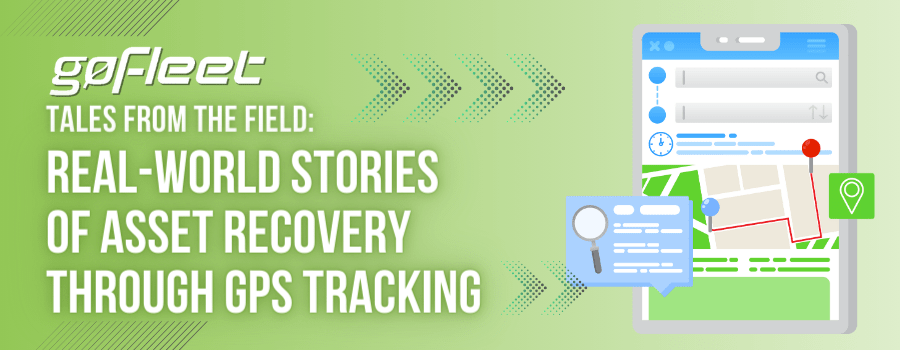In today’s fast-paced world, where the mobility of assets can often spell the difference between success and setback, the technology of GPS tracking stands as a sentinel of security and assurance. GPS, or Global Positioning System, is a technological marvel that has transformed how we track and manage assets across the globe. Initially developed for military use, GPS has seamlessly integrated into the civilian sphere, offering real-time location data with remarkable accuracy. This technology utilizes a network of satellites orbiting the Earth to pinpoint the exact location of an object equipped with a GPS receiver.
The importance of asset recovery transcends various industries, emerging as a critical component in safeguarding investments and ensuring operational continuity. From recovering stolen vehicles to protecting valuable equipment in construction sites, and managing large fleets of transport vehicles, the applications of GPS tracking are as diverse as they are crucial. In the realm of personal asset protection, GPS technology offers peace of mind, allowing individuals to keep track of their valuables with ease.
In this article, we delve into the real-world stories that bring to life the indispensable role of GPS tracking in asset recovery. Through a series of case studies, we will explore how this technology has provided tangible solutions in different scenarios — from the dramatic recovery of stolen goods to the efficient management of corporate assets. Join us as we journey through these tales from the field, showcasing the remarkable capabilities and benefits of GPS tracking in the modern world.
Understanding GPS Tracking
GPS tracking, a cornerstone of contemporary asset management and recovery, is rooted in sophisticated technology yet operates on a conceptually simple principle. At its core, GPS tracking involves the use of a network of about 30 satellites constantly orbiting the Earth, which communicate with GPS receivers on the ground to determine precise geographical locations. These satellites transmit signals that are picked up by receivers, commonly embedded in the assets being tracked. By calculating the time it takes for these signals to travel from the satellites to the receiver, the system can accurately pinpoint the exact location of the asset, often to within a few meters.
The spectrum of assets tracked using GPS is vast and varied, reflecting the technology’s versatility and adaptability to different needs and industries. In the automotive sector, GPS tracking is instrumental in monitoring and recovering vehicles, whether personal cars or commercial fleets. The construction industry relies heavily on GPS to safeguard expensive equipment and machinery, which are often vulnerable to theft given their high value and the open nature of construction sites. Similarly, logistics and transportation businesses utilize GPS tracking for fleet management, ensuring timely delivery and operational efficiency. Beyond these, personal assets like electronics, artworks, and even pets are increasingly being tracked using GPS, offering individuals a sense of security and control over their valuables.
GPS tracking in asset recovery acts as a potent deterrent to theft, as the knowledge of a tracking system can dissuade potential thieves. In instances where theft does occur, the real-time tracking capabilities of GPS enable quick response and recovery, significantly reducing the likelihood of loss. Additionally, GPS tracking data can provide valuable insights into asset usage and movements, facilitating better resource management and operational efficiency. For insurance purposes, the presence of GPS tracking can often lead to reduced premiums, given the lower risk associated with well-monitored assets.
Case Study 1: Recovering Stolen Vehicles
One compelling instance of GPS tracking’s efficacy in vehicle recovery involves Jonah Herman from Portland, Oregon. His experience underscores the critical role of GPS technology in asset recovery and highlights the challenges and opportunities in law enforcement collaboration in such scenarios.
The Incident:
Jonah Herman’s BMW was stolen from outside his apartment in Portland’s Pearl District. The theft seemed to have occurred after someone presumably snatched his keys while he was entering his building. Herman had equipped his keys with an Apple AirTag tracker, which he later discovered was pinging from a location just a mile away from his apartment. Additionally, his car was fitted with an “Elo GPS” tracking system. Upon checking the GPS data, Herman realized that his car was located near where his keys were detected, leading to the shocking realization that his vehicle had been stolen.
Role of GPS Tracking and Personal Initiative:
Herman contacted the police to report the theft, but due to a delayed response, he decided to take matters into his own hands. Guided by the GPS tracker, he traced his car to 11th and Washington. The GPS data also revealed that the thieves had taken the vehicle on a joyride before abandoning it. Upon arrival at the location, Herman discovered that the license plates had been removed, a common tactic by thieves to avoid detection. Remarkably, he was able to recover his car himself before the police could respond to his call, due to the effectiveness and immediacy of GPS tracking in asset recovery.
Impact on Vehicle Owner and Reflections on Community Responsibility:
The incident left Herman with a deep appreciation for GPS tracking technology, particularly in a city grappling with frequent car thefts. He emphasized the importance of community involvement in addressing such issues, especially in situations where law enforcement resources are stretched thin. This sentiment reflects a broader perspective on the role of individuals and technology in supplementing traditional law enforcement efforts.
Insurance Implications:
While Herman’s story does not delve into the specific insurance implications of the recovery, it is widely recognized that the presence of GPS tracking can significantly influence insurance processes. In many cases, insurance companies offer lower premiums for vehicles equipped with tracking devices due to the reduced risk of loss. Moreover, the ability to quickly recover a stolen vehicle can minimize insurance claims related to theft, potentially saving both the insurer and the insured significant costs and hassle.
Case Study 2: Protecting Construction Equipment
Construction sites are inherently challenging to secure due to their open nature and the high value of the equipment. The National Insurance Crime Bureau (NICB) reports that as much as $1 billion is lost annually in the U.S. from the theft of construction equipment and tools, with a recovery rate of less than 20%. These sites are targeted for several reasons, including the value of the equipment, poor site security, and the leniency of penalties for thieves if caught and convicted.
Real-world Example of GPS Tracking Saving Construction Equipment:
The case of the construction industry showcases how GPS tracking can offer real-time feedback on the location of assets, a capability that traditional measures like hub meters or hour meters lack. GPS tracking helps in monitoring not just large equipment, but also smaller, easily misplaced items like trailers, generator sets, light towers, and tools. The technology enables the establishment of geofences — geographical boundaries set by managers. If an asset crosses these boundaries, an alert is sent to the manager, thus combating theft and unauthorized use.
Long-term Benefits for the Construction Industry:
The long-term benefits of GPS tracking in the construction industry are substantial. The technology reduces the risk of theft and increases the chances of recovering stolen equipment. Additionally, GPS trackers provide 24-hour monitoring without breaks, a feature that is particularly advantageous compared to other security measures like surveillance cameras or security personnel, which are either limited in coverage or expensive to maintain. Furthermore, GPS tracking facilitates inventory control by enabling managers to keep track of assets without physically visiting sites. Advanced tracking systems can even provide alerts for significant changes in an asset’s conditions, such as temperature, tilt, and vibration, offering comprehensive asset management solutions.
Case Study 3: Managing Fleet Vehicles
GPS tracking has become an essential tool in managing fleet vehicles, offering real-time location data, enhancing security, and improving operational efficiency. For companies with a fleet of vehicles, especially in the construction industry, GPS tracking is not just about locating vehicles; it’s about safeguarding assets that are crucial for business operations.
A Detailed Account of a Company Recovering a Fleet Vehicle:
An illustrative example of GPS tracking’s effectiveness is the case of Interwest Construction Inc. Kristal Wagner, a representative of the company, received an email alert from their fleet GPS tracking system, indicating that one of their trucks was on the move during an unusual hour. Realizing that the vehicle had been stolen, Wagner quickly contacted the police and activated the fleet GPS system installed in the vehicle. Using the real-time tracking data, she provided the exact location of the vehicle to law enforcement. This swift response led to the recovery of the truck within a couple of hours. While some small, less valuable items were stolen from the truck, the vehicle itself was not damaged, showcasing the rapid recovery capability enabled by GPS tracking.
Cost Savings and Operational Efficiencies Gained:
The incident with Interwest Construction Inc. highlights the broader implications of GPS tracking in fleet management. The National Insurance Crime Bureau reports that over 1.2 million vehicles were stolen last year in the U.S., with nearly half never recovered. These thefts have a significant financial impact, often leading to operational disruptions and substantial replacement costs. With GPS tracking, the recovery rate of stolen assets increases dramatically, as the technology allows for real-time asset tracking and quick response. In many cases, vehicles can be recovered in less than 24 hours, minimizing the impact on business operations and potentially saving companies millions of dollars annually.
Case Study 4: Personal Asset Protection
Personal asset protection using GPS tracking devices has seen a rise in recent years, with individuals leveraging this technology to safeguard their valuables. These real-world stories not only demonstrate the effectiveness of GPS tracking in recovering personal assets but also delve into the psychological impact of such recoveries on individuals.
Personal Stories of GPS Tracking Used for Safeguarding Personal Valuables:
- Stolen Leaf Blower Recovery: A landscaper, having faced multiple thefts of leaf blowers, decided to install GPS trackers on his equipment. This proactive measure paid off when a leaf blower was stolen from his truck. Thanks to the GPS tracker, the stolen equipment was successfully recovered.
- Cross-Country Car Recovery: In another instance, a car stolen in North Carolina was taken on a joyride to New York. The vehicle, equipped with a car GPS tracker, was quickly located and recovered by the police, demonstrating the wide-reaching capabilities of GPS tracking in asset recovery over long distances.
- Home Burglary in Arizona: Allen Crosby of Phoenix, Arizona, experienced a burglary where over $10,000 worth of valuables, including electronics and jewelry, were stolen from his home. Crosby had equipped his valuables with micro personal GPS tracking units, which were instrumental in leading to the arrest of the burglar. The GPS tracker hidden inside a stolen camera allowed law enforcement and Crosby to track the stolen items to the suspect’s residence. The GPS unit emitted a beeping sound, guiding the police to the exact location of the stolen goods inside the house, leading to an arrest within 24 hours of the burglary.
The Psychological Impact of Asset Recovery on Individuals:
The emotional relief and psychological reassurance provided by successful asset recovery cannot be overstated. In the case of Allen Crosby, the recovery of his valuables not only brought back material possessions but also instilled a sense of justice and security. Despite not recovering all his stolen items, Crosby expressed gratitude for the technology that helped him reclaim a significant portion of his valuables. His story reflects a common sentiment among individuals who have benefited from GPS tracking: a renewed faith in technology as a tool for personal security and a deterrent against crime. The ability to actively participate in the recovery process, rather than feeling helpless, can offer significant emotional relief and a sense of control over personal assets.
Legal and Ethical Considerations
GPS tracking, while a powerful tool for asset recovery, operates within a legal framework that varies by jurisdiction. The primary legal consideration is the right to privacy. In many regions, laws require consent from individuals before tracking their movements, especially in the context of employment. For personal assets, the legalities are generally straightforward, as individuals have the right to track their own property. However, when deploying GPS tracking on vehicles or equipment used by others, it’s essential to navigate the complex landscape of privacy laws and ensure compliance.
Ethical Implications and Privacy Concerns:
Beyond legalities, ethical considerations are paramount. The use of GPS tracking raises questions about the balance between the need for security and the right to privacy. For instance, while employers may have legitimate reasons to track fleet vehicles, there’s an ethical obligation to respect employee privacy and avoid unnecessary surveillance. Similarly, in personal contexts, using GPS trackers on items that may be accessed or used by others necessitates careful consideration of their privacy rights. Transparency in the use of GPS tracking devices, along with clear policies outlining their use, can help mitigate potential ethical dilemmas and privacy issues.
Final Thoughts
The stories and case studies presented throughout this blog underscore the remarkable effectiveness of GPS tracking in asset recovery across various domains. From recovering stolen vehicles to safeguarding construction equipment, managing fleet vehicles, and protecting personal valuables, GPS tracking has proven to be an indispensable tool. Its ability to provide real-time, precise location data not only aids in rapid recovery but also contributes to significant cost savings and operational efficiencies.
As technology continues to evolve, the adoption of GPS tracking systems is becoming increasingly vital for businesses and individuals alike. The integration of such technologies into asset management strategies not only enhances security but also provides peace of mind.
If you’re interested in exploring the potential of GPS tracking for asset protection, contact a GoFleet specialist today. Our consultants offer expertise in this field, and can provide tailored advice and solutions to meet your specific requirements.
Protect your assets effectively with advanced GPS tracking solutions. Contact us today for more information, and start securing your valuables with confidence.


